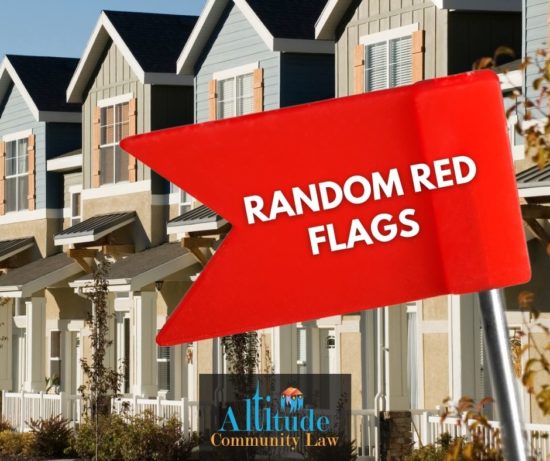
Sometimes we get so used to doing things the way we’ve always done them; we don’t notice (or know to notice) that something is off. In an HOA context, red flags are often missed because they are legal in nature and hidden in the course of ordinary business.
Below are a few random red flags that may exist in your community but have not been noticed.
Tax bills on common area(s):
This is a red flag because common areas cannot get taxed pursuant to the Colorado Common Interest Ownership Act (“CCIOA”), and if your community is receiving a tax bill, that’s usually a sign of one of two possible problems: the developer never transferred the common area to the association or the assessor’s office has the wrong information in its system. If this occurs in your community, make sure you reach out to the association’s legal counsel to figure out next steps.
The definition of “Association” in the declaration is different than the name in the articles of incorporation:
You may find this hard to believe, but sometimes developers and/or successor developers screw up. One way they can mess up is by creating a corporate name that is different than the association name. This can cause many problems later on because the common area tracts will be deeded to one entity but not the other. This problem can also be resolved by working with the association’s legal counsel.
Board members having one-on-one meetings and/or discussions with upset owners:
Although directors often try to help resolve disputes between individual owners and the association, having one-on-one meetings or discussions is not the way to do it. Ultimately, the owner will claim the director made statements or promised things that the director either did not or did not realize he/she did. Also, one director does not have the authority to make a decision with respect to resolution by him/herself—such decisions must be made by a majority board vote. Therefore, these noble attempts by directors to solve disputes oftentimes end up putting the director in a defensive position by having to defend what he/she said and representations made.
Board members voting by proxy:
This may or may not present a problem depending on whether you have reviewed the association’s bylaws and found a provision authorizing directors to use proxies at board meetings. Keep in mind; this authorization will not be found in the sections dealing with membership meetings and owners’ use of proxies. Instead, this provision will be contained in the section addressing board members and board meetings. If you aren’t sure if your bylaws contain this authority, check with the association’s legal counsel.
Should you have any questions about any of the above discussed red flags, please do not hesitate to contact an Altitude attorney at (303) 432-9999 or at [email protected]